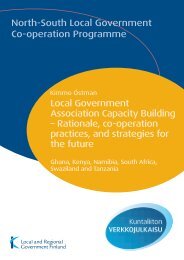E-READINESS QUESTIONNAIRE FOR NORTH ... - Kunnat.net
E-READINESS QUESTIONNAIRE FOR NORTH ... - Kunnat.net
E-READINESS QUESTIONNAIRE FOR NORTH ... - Kunnat.net
Create successful ePaper yourself
Turn your PDF publications into a flip-book with our unique Google optimized e-Paper software.
70<br />
�<br />
�<br />
�<br />
8.3 Economy<br />
8.4 ICT Landscape<br />
0-14 years: 38.6% (male 260,840/female 254,781)<br />
15-64 years: 57.9% (male 383,236/female 391,478)<br />
65 years and over: 3.5% (male 19,857/female 26,994) (2010 est.)<br />
Other population indicators include:<br />
� Urban population: 25% of total population (2008)<br />
rate of urbanization: 1.7% annual rate of change (2005-10 est.)<br />
� Literacy (defi nition: age 15 and over can read and write of the total population:<br />
81.6% male: 82.6% female: 80.8% (2003 est.)<br />
� Population: African 97%, European 3%<br />
� Religions: Zionist 40% (a blend of Christianity and indigenous ancestral worship),<br />
Roman Catholic 20%, Muslim 10%, other (includes Anglican, Bahai, Methodist,<br />
Mormon, Jewish) 30%<br />
In this small, landlocked economy, subsistence agriculture occupies approximately<br />
70% of the population. The manufacturing sector has diversifi ed since the mid-1980s.<br />
Sugar and wood pulp remain important foreign exchange earners. In 2007, the sugar<br />
industry increased effi ciency and diversifi cation efforts, in response to a 17% decline in<br />
EU sugar prices. Mining has declined in importance in recent years with only coal and<br />
quarry stone mines remaining active. Surrounded by South Africa, except for a short<br />
border with Mozambique, Swaziland is heavily dependent on South Africa from which<br />
it receives more than nine-tenths of its imports and to which it sends 60% of its exports.<br />
Swaziland’s currency is pegged to the South African rand, subsuming Swaziland’s<br />
mo<strong>net</strong>ary policy to South Africa. Customs duties from the Southern African Customs<br />
Union (SACU) account for two-thirds of Swaziland’s government revenues, and<br />
worker remittances from South Africa substantially supplement domestically earned<br />
income. Customs revenues plummeted during the global economic crisis and Swaziland<br />
has appealed to SACU for assistance. With an estimated 40% unemployment<br />
rate, Swaziland’s need to increase the number and size of small and medium enterprises<br />
and attract foreign direct investment is acute. Overgrazing, soil depletion, drought,<br />
and sometimes fl oods persist as problems for the future. More than one-fourth of the<br />
population needed emergency food aid in 2006-07 because of drought, and more than<br />
one-quarter of the adult population has been infected by HIV/AIDS 88 .<br />
Swaziland is one of the last countries in the world with an almost complete monopoly<br />
in all sectors of its telecommunications market. The state-owned posts and telecommunications<br />
operator, SPTC also acts as the industry regulator and has a stake in the<br />
country’s sole mobile <strong>net</strong>work, in partnership with South Africa’s MTN. Nevertheless,<br />
fi xed and mobile pe<strong>net</strong>ration is relatively high compared with other countries in the<br />
region. Mobile market pe<strong>net</strong>ration is at more than 60%. More than 90% of all telephones<br />
in the country are mobile phones. While Inter<strong>net</strong> usage is growing reasonably<br />
fast, the level of pe<strong>net</strong>ration is still well below international standards, but about average<br />
in the region 89 . The planned unbundling and eventual privatisation of the incumbent<br />
and the introduction of more competition would enable the market to live up to<br />
its relative GDP strength.<br />
88 http://indexmundi.com/swaziland/economy_overview.html<br />
89 http://www.infodev.org/en/Publication.431.html




